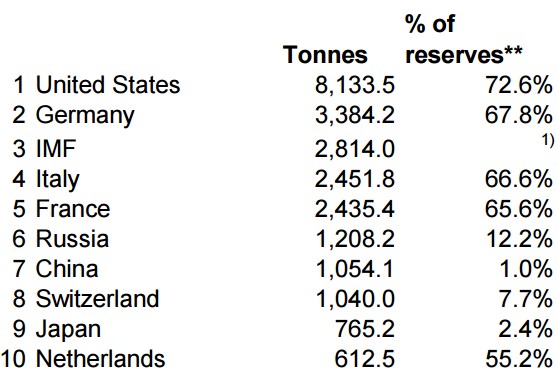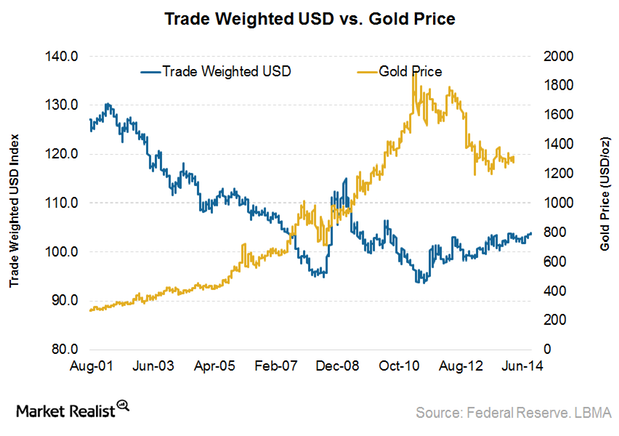10 Countries Stocking Up on Gold Now

The World Gold Council's latest gold inventory report is out, and the news this time is really shocking. As of February, the United States continues to lead the group with around 8,133 tons of gold, accounting for a whopping 72% of U.S. total reserves. Germany comes in second with 3,381 tons in February, or 66% of its total reserves, at the same time as France and Italy both counted in excess of 2,400 tons of gold, more than 60% of their respective national reserves each.

Canada went "all out"
Canada is also among the G7 official wealthiest countries on the planet. As of the end of February 2016, Canada made headlines by announcing it got rid of all its gold! This news shocked the gold and central banking world as Canada sold off its final remaining reserves of 21,851 ounces of gold coins during the month of February. The finance department announced this in its periodic disclosure of international reserves not in shame as one might reasonably expect, but with a sense of accomplishment and satisfaction.
The sad tale of the decline and fall of the once mighty Canadian national gold reserves goes back to 1965, over 50 years ago. At that historic moment, Canadian gold reserves touched their peak level and value with more than $1,150,000,000 value of coins and bullion. This all began to take a change for the worse in 1980, with the government's tragic and ill-fated decision to start selling off its gold reserves at a so-called "gradual and controlled pace." They did this with the deliberate intention of increasing their returns on reserves.
In fact, they invested most of the fairly massive proceeds in foreign currency assets that were interest bearing in lieu of their rainy day gold assets and reserves, per the website of the finance department of Canada. The end result of all this questionable activity finally manifested itself in end of February 2016. While the Indians, Russians, and especially Chinese have massively been increasing their gold reserves over the past more than three decades, Canada has nothing golden left to show in its once-vast reserves but a paltry 77 ounces of the golden metal.

What Was The Canadian Government Thinking?
One might reasonably conclude that Ottawa has literally lost its mind. The information from the World Gold Council suggested that Canada is alone among its wealthy peers, the only one of the G7 nations that no longer has a stockpile of gold amounting to minimally hundreds of tons of gold.
Believe it or not though, Canada is not the only G7 nation to have questionably sold off gold in the past decades though.
When Britain's Gordon Brown was Chancellor of the Exchequer for Prime Minister Tony Blair, Brown came up with the ill-conceived notion to sell off most of Britain's vast gold reserves at the lowest price per ounce that the yellow metal had witnessed in years. At the time, Britain did not need the money, and there was no practical reason for engaging in such a silly and ill-advised idea. This might represent the only more senseless act than the Ottawa government's short-sighted decision to sell off their entire gold reserves and stockpiles at a time when the world economy and financial system look frailer and more fragile than ever.
Yet the Canadian officials are not apologizing for their choices, nor was this action of theirs entirely unforeseen. They had already sold off the last of their high quality gold bullion back in December of 2003. Meanwhile, the last of their high quality gold coins Ottawa sold off by the end of January in 2014. The last ounces that remained were hundred year old King George V coins in $5 and $10 denominations. Ottawa decided to melt these down and cast them into bullion bars form to sell them off at market prices.
Canada has continued to sell off their once-mighty golden hoard for decades now. In the last few years, the government began to increase its reserves of British Pounds and American Dollars with the final proceeds from their golden treasure trove. This is what Ottawa has actually been doing with its so-called windfall from selling off its emergency rainy day national assets. Looking at the chart of gold versus the value of the dollar over the last decade, it would seem the Canadian government in Ottawa has not carefully and properly done their homework.

Canada now at the bottom of the WGC list with Haiti, Trinidad & Tobago, Papua New Guinea and Albania
If you're wondering what other "developed nations" have very low amounts of gold in their coffers, you're out of luck. The latest numbers of the World Gold Council show that Canada will now get a warm seat at the bottom of the World Gold Council table with the likes of Haiti, Trinidad & Tobago, Papua New Guinea and Albania... all holding dismal amounts of the yellow metal.

What Other Countries Are Stocking Up on Gold These Days?
Meanwhile, the same World Gold Council report tells a starkly different tale regarding other national central banks beyond the confines of Canada. For the last quarter of 2015, the net changes in the investing in gold holdings by the national central banks turned out to be plus 33 tons. The full year 2015 witnessed an uptick from 2014's 584 tons purchased to 2015's 588 tons acquired.
This occurred at the same time as the Canadians were busy liquidating the rest of their gold positions. These other wiser countries were acting in response to additional diversification requirements as oil prices collapsed and world confidence in the international economy dampened. The fourth quarter demand for gold by central banks climbed an impressive 25% from the year over year Q4 2014 levels of demand. For the second half in 2015, these same central banks purchased 336.2 tons of gold versus the 252.1 tons in the first half and 308.8 tons in the second half of 2014. This represented the 20th consecutive quarter where national central banks were net purchasers of the yellow metal that consistently proves to be the only bankable storehouse of value when all of the proverbial chips are down. All this is to say that it looks like the Canadian government was all by its lonesome self in selling off the last of its precious gold reserves this last year.
Russia
Even though Russia's finances are in shambles thanks to the global collapse in oil prices, the Russian Bear still added significantly to its foreign gold reserves by increasing them to 1,392.9 tons of gold representing 13% of reserves. Russia has been trying to bolster the value of its currency by backing it increasingly by higher gold reserve holdings to try to give it more stability and to demonstrate that their economic might is not simply dependent on the price of oil.
Jordan
The Hashemite Kingdom may not boast any oil wealth, but they do maintain a fairly significant gold reserves which their central bank has been increasing for some time now. Latest reported holdings for Jordan amount to 41.1 tons of gold, representing 8% of their foreign reserves.
Tajikistan
This Central Asian and former Soviet Union member state takes its gold reserves incredibly seriously. They have been adding to their totals for several years now. As of the end of December in 2015, Tajikistan's central bank holds 11.9 tons of gold, representing an astonishing 87.6% of their total central bank reserves. This should be a high enough percentage to make them the most gold hungry central bank and nation per central reserves stock in the entire world.
China
Communist China has a love-love relationship with gold. They have been trying to stabilize their currency by backing it with gold for years. Until the recent announcement that the IMF had added their currency the Remnibi to the basket of SDR's, the Communist country was also still trying to massively increase their gold reserves to demonstrate their economic stability and power along with their rising national wealth levels. The People's Bank of China expanded holdings by 0.6 percent to 1,762.3 tons of gold, representing a still paltry 1.8% of total central bank reserves. With the world's fifth largest holdings of gold by tons, they have successfully blown past long time, once great gold holding nations such as Great Britain, the European Central Bank, Switzerland, and the Netherlands. It's all in the strategic and political gain the Chinese gain from this massive increase in gold holdings, not to mention it makes their currency look more attractive at the same time.
United Arab Emirates
The collection of Emirates has built up a fairly impressive collection of gold reserves among their various principalities. With this past December's increase, they are up to a rising 7.4 tons of gold for only .3% of their total reserves.
Malaysia
The Asian powerhouse has begun an initiative to boost its gold reserves this past year and over the past several years. They are making progress and are now up to 38.3 tons for 1.4% of total reserves.
Kazakhstan
Another once-oil rich Central Asian former Soviet state, Kazakhstan has engaged in gold bullion purchases for its 40th straight month. Kazakhstan raised its stash to 221.8 tons for 2.9% of central bank foreign reserves. With another over 97% of reserves in other currencies and instruments, they still have plenty of rebalancing into gold left to run.
Ukraine
The Eastern European country torn by civil war and Russian aggression is still growing its gold reserves as aggressively as it can, no doubt in part hoping to stave off currency and ultimately economic collapse. They reached 27.4 tons for 7.0% of international central bank reserves at the end of 2015.
Mauritius
This tiny Indian Ocean island nation of Mauritius has made headlines in recent years by announcing central bank purchases of gold reserves. As the smallest nation actively adding to its hoard, Mauritius is now up to 8.9 tons for 7.1% of reserves. It is easy to see how they could shift more of their remaining nearly 93% of reserves into gold if they continue at this pace over the coming quarters and next several years.
India
India may not be on the above chart, but they are almost always growing their international gold reserves. This year their eleventh largest holding of gold on earth totalled 557.7 tons of gold for 5.4% of central bank reserves. India may have taken a breather this year, but you can rest assured that their central bank will resume yellow metal purchases in the near future.
In Conclusion
Not since British Chancellor of the Exchequer Gordon Brown sold off nearly the entire national gold reserves of Great Britain has such a national debacle been allowed to consume a nation's vital gold reserves. No other major national central banks anywhere on earth are selling their gold now, and many of them are instead acquiring additional gold reserves with whatever spare assets they can muster up. Even after selling off the lion share of its gold, Great Britain still boasts over 310 tons of gold reserves at 8.2% of its Bank of England reserves. This means that the Canadian government in its infinite wisdom is selling the precious metal when everyone else of any importance in the central banking world is buying gold. At least the Canadians will be able to look back wistfully and say with a smirk that they sold off the last of their gold at a relatively high price per ounce, something the embarrassed British will never be able to do now.
Author Recent Posts